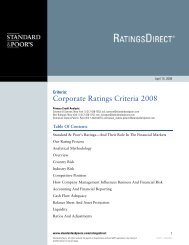European Infrastructure Finance Yearbook - Investing In Bonds ...
European Infrastructure Finance Yearbook - Investing In Bonds ...
European Infrastructure Finance Yearbook - Investing In Bonds ...
You also want an ePaper? Increase the reach of your titles
YUMPU automatically turns print PDFs into web optimized ePapers that Google loves.
PROJECT FINANCE/PUBLIC-PRIVATE PARTNERSHIPS<br />
Publication Date:<br />
Sept. 28, 2007<br />
Issuer Credit Rating:<br />
AA-/Stable/A-1+<br />
Primary Credit Analyst:<br />
Jonathan Manley,<br />
London,<br />
(44) 20-7176-3952<br />
Secondary Credit Analysts:<br />
Karim Nassif,<br />
London,<br />
(44) 20-7176-3677<br />
Luc Marchand,<br />
London,<br />
(44) 20-7176-7111<br />
Lidia Polakovic,<br />
London,<br />
(44) 20-7176-3985<br />
132 ■ NOVEMBER 2007<br />
ABU DHABI NATIONAL ENERGY COMPANY PJSC<br />
Rationale<br />
On Sept. 28, 2007, Standard & Poor’s Ratings<br />
Services affirmed its ‘AA-‘ long-term and ‘A-1+’<br />
short-term corporate credit ratings on Abu Dhabi<br />
National Energy Company PJSC (TAQA)<br />
following TAQA’s announcement of its intention,<br />
subject to various regulatory and administrative<br />
approvals, to acquire Canada-based PrimeWest<br />
Energy Trust for approximately C$5 billion,<br />
funded primarily by debt.<br />
The affirmation reflects our expectation of<br />
ongoing implicit sovereign support for TAQA<br />
given the company’s importance to the Emirate of<br />
Abu Dhabi (AA/Stable/A-1+) and its status as a<br />
government-related entity (GRE). The ratings<br />
continue to be based on a “top-down” rating<br />
approach, which takes the sovereign rating as the<br />
starting point of the analysis, reflecting the<br />
company’s position as a key entity in Abu Dhabi’s<br />
economy and its importance as a national vehicle<br />
for global investment and public policy.<br />
Following the PrimeWest acquisition, up to onehalf<br />
of the company’s forecast EBITDA will likely<br />
be generated outside of the United Arab Emirates<br />
(UAE). This is consistent with the company’s<br />
originally stated investment policy to undertake<br />
international infrastructure investments. Our<br />
opinion remains that, in a financial stress<br />
scenario, unlike the company’s UAE-based assets<br />
that are, for example, critical to the provision of<br />
water and power to the Emirate, non-UAE<br />
activities may not receive the same level and<br />
timeliness of sovereign financial support.<br />
<strong>In</strong> respect of this specific acquisition, however,<br />
Standard & Poor’s has analyzed the extent and<br />
timing of support that could be forthcoming in<br />
the event of a stress scenario. <strong>In</strong> this case, we<br />
understand that it is the Emirate’s intention to<br />
treat these non-UAE assets in the same manner as<br />
those in the UAE. <strong>In</strong> addition, the Emirate’s<br />
review of all acquisitions (including that proposed<br />
for PrimeWest) and the proposed corporate<br />
structure of the acquisition within the overall<br />
TAQA group of companies further substantiate<br />
the sovereign’s likely support for these assets. No<br />
explicit guarantee has been provided, however.<br />
<strong>In</strong>cluding the PrimeWest acquisition, TAQA has<br />
committed nearly $10 billion in the acquisition of<br />
various energy-related assets outside the UAE in<br />
the past 12 months. The acquisitions have been<br />
broadly consistent with the investment framework<br />
originally set out by management, although both<br />
the pace of the acquisitions and the level of<br />
STANDARD & POOR’S EUROPEAN INFRASTRUCTURE FINANCE YEARBOOK<br />
investment in Canadian assets have been greater<br />
than originally planned. We estimate that the<br />
investments acquired to date are likely to be of<br />
low investment-grade/high speculative-grade<br />
credit quality on a stand-alone basis. A key<br />
challenge for TAQA remains the successful<br />
integration and realization of anticipated returns<br />
from these various acquisitions. As a result of this<br />
debt-financed investment activity, TAQA’s<br />
financial profile is very aggressive, characterized<br />
by high leverage and relatively low interest<br />
coverage levels. Standard & Poor’s will<br />
increasingly focus on the credit quality of the<br />
underlying investment portfolio and the strength<br />
of the relationship with the sovereign as critical<br />
elements driving the ratings. <strong>In</strong>vestment in weaker<br />
credit quality assets, for example, increases the<br />
likelihood that sovereign financial support will be<br />
called on. Standard & Poor’s will meet with<br />
management and Emirate representatives in the<br />
next month to discuss the future investment<br />
strategy and the potential parameters and method<br />
by which sovereign support can be given to<br />
the company.<br />
Liquidity<br />
TAQA’s liquidity derives from its above-average<br />
UAE dirham 6.239 billion ($1.7 billion; as at June<br />
30, 2007, prior to the execution of recent<br />
acquisitions) cash balance invested in various<br />
short-term deposits. The company also has an<br />
established $1 billion revolving credit facility<br />
from a domestic bank.<br />
Outlook<br />
The stable outlook reflects Standard & Poor’s<br />
expectation that there will be no major changes in<br />
the implicit government support to the company<br />
as a GRE. This implies that the state will support<br />
TAQA in the event of financial distress should<br />
existing or future investments not perform in line<br />
with expectations. The outlook also assumes that<br />
the company will execute its business plan<br />
successfully and meet its financial forecasts.<br />
The rating would be raised, or the outlook<br />
revised to positive, if there is a similar change in<br />
the rating or outlook on the sovereign, or in the<br />
case of enhanced sovereign support. The rating<br />
would be lowered, or the outlook revised to<br />
negative, if there is any weakening of sovereign<br />
support for the company or if the underlying<br />
consolidated credit quality of the investment<br />
portfolio reduces. ■



